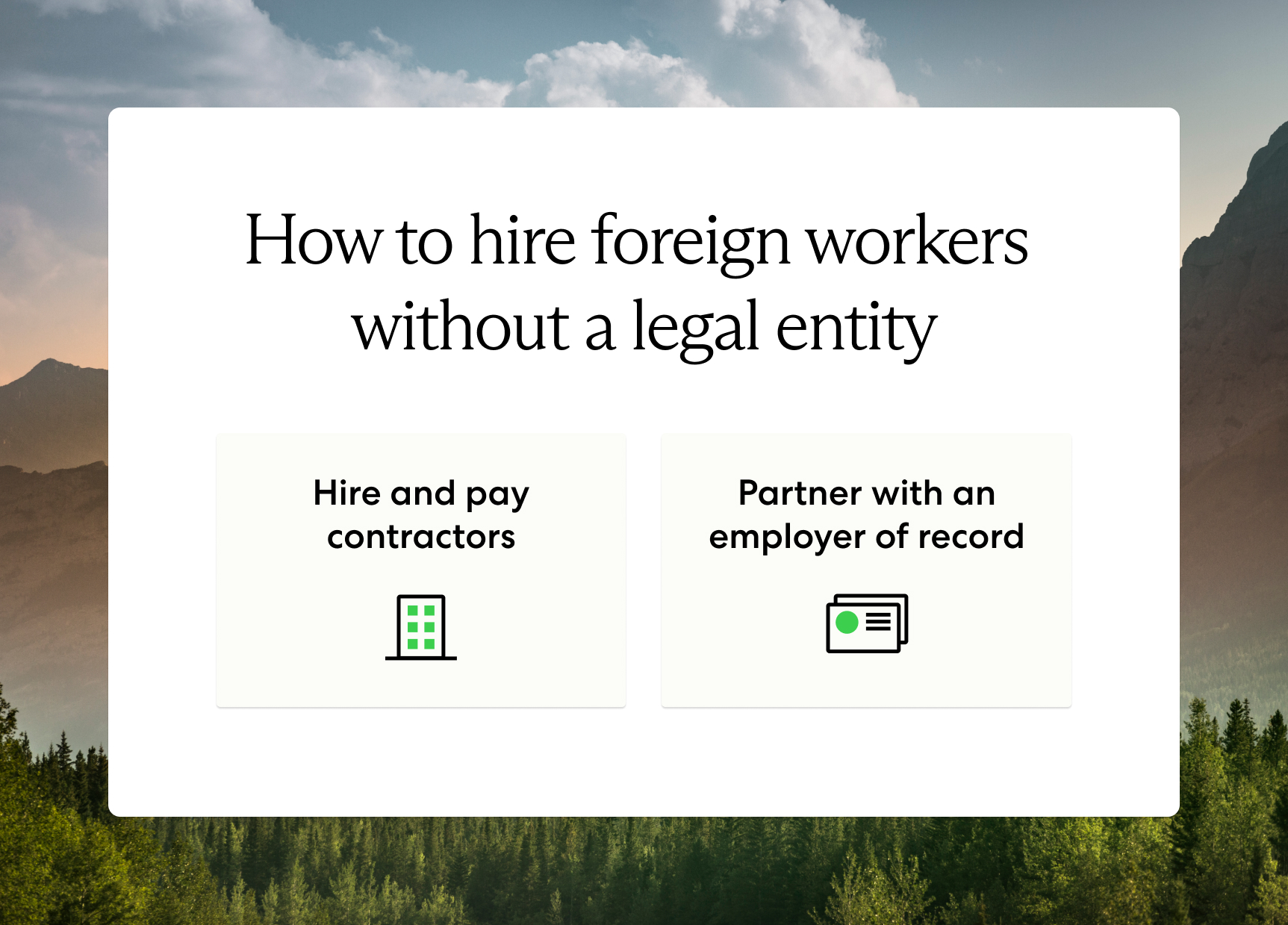In today’s interconnected world, hiring foreign workers is a viable growth strategy for any business, whether scaling an existing global team or hiring international talent for the first time.
However, the old model of establishing legal entities to build international teams is costly, time-consuming, and inefficient. By partnering with a global expansion expert or hiring international contractors, employers can engage talent overseas with greater efficiency and flexibility while remaining on budget.
Read on to learn everything you need to know about hiring foreign workers without setting up a legal entity.
How to hire foreign workers without a legal entity
Global companies can hire foreign workers without establishing a legal entity by engaging international contractors or partnering with an employer of record (EOR). Each option involves unique advantages, from speed-to-market and cost-savings to risk mitigation. The best method for any business depends on its budget and international expansion goals.
We discuss each approach in detail below.

Hire and pay contractors
Engaging international contractors offers global companies a flexible, cost-effective, and low-commitment approach to hiring foreign workers.
This option allows you to quickly access the global talent pool, add new knowledge and perspective to your team, and remain agile as you expand.
By hiring contractors, businesses can enjoy the following benefits:
- Diversification. Companies can source talent with specialized skills for short-term projects.
- Speed-to-market. Companies can engage talent within weeks.
- Time savings. HR and finance departments save time and resources they would otherwise spend on paying and supporting a team of full-time employees.
- Cost savings. By hiring contractors, you avoid registration, legal, accounting, certification, and other fees associated with entity establishment.
While some companies find success enlisting large teams of international contractors, this approach involves two key disadvantages: limited growth potential and risk exposure.
Working with contractors on short-term assignments makes it difficult to create continuity in your talent base, limiting your ability to pivot your strategy and expand with confidence. Global companies often need a cohesive, committed team of full-time employees to maintain steady growth.
Plus, engaging contractors involves misclassification risk. Worker classification refers to how you designate talent—as contractors or employees. Misclassification occurs when a company classifies talent as contractors while maintaining an employment relationship with them.
In many countries, it’s relatively easy for foreign employers to unknowingly establish an employment relationship with a contractor and subject their company to legal entanglements, fines, reputational damage, and business interruptions.
Consider France, for instance: providing French contractors with work equipment can establish an employment relationship and subject your company to fines, employee backpay, benefits arrears, and injunctions.
To ensure ongoing compliance, HR teams must practice due diligence. If you choose to hire contractors, consider seeking counsel from a local legal expert in your target market.
Learn more: Hire a Contractor vs. an Employee
Partner with an employer of record (EOR)
Partnering with an EOR is the most efficient way to hire foreign workers.
This approach offers global companies the flexibility and cost-savings of hiring contractors without the added risk. Plus, it allows you to build a cohesive, committed team of full-time employees without the delays and costly investments associated with entity establishment.
An EOR is a third-party entity with global infrastructure and international legal expertise that makes it easy for companies to hire talent overseas without establishing legal entities or worrying about violating local employment regulations.
Think of an EOR partner as your global HR team—they provide support at every stage of international hiring while ensuring compliance along the way.
For instance, an EOR can handle all of the following on your behalf:
- Hiring
- Onboarding
- Immigration
- Regulatory compliance
- Running global payroll
- Administering global benefits
- Providing ongoing HR support
Partnering with an EOR is an ideal solution for any company looking to grow its global footprint by scaling an existing international team or tapping into the global workforce for the first time. It also serves as an ideal bridge solution for immediately engaging foreign talent while undergoing lengthy incorporation procedures.
An EOR partner handles all the heavy lifting and risks associated with building international teams, allowing you to focus on the big picture of running your business as you expand.
Learn more: What Is an Employer of Record (EOR)?
How does an EOR work?
With access to global infrastructure, a network of international legal experts, and a suite of workforce management solutions, an EOR streamlines every aspect of hiring foreign workers while enriching the employee experience.
With its own entity network, an EOR can serve as the legal employer of your global workforce. This eliminates the need for entity establishment on your side while enabling you to quickly and compliantly build a cohesive team of full-time, supported employees in any market.
Plus, with international legal expertise, an EOR ensures compliance with local labor and tax regulations as you expand.
For instance, an EOR can handle the following compliance issues on your behalf:
- Drafting employment contracts
- Correctly classifying employees
- Making accurate tax withholdings
- Running timely payroll
- Conducting regular workplace audits and regulatory reviews
An EOR also offers a suite of global workforce management solutions that streamline international HR processes and consolidate them into easy-to-use platforms, making hiring, paying, and managing your international team simple and intuitive.
An EOR facilitates an efficient, agile global HR infrastructure that makes hiring foreign workers and expanding your global footprint compliant, flexible, and budget-friendly.
The benefits of choosing an EOR when hiring foreign workers
Whether you envision a large and expanding operational footprint overseas or you want to engage international talent for cost-savings and diversification, an EOR can streamline the entire process.
The primary benefits of partnering with an EOR include cost savings, speed-to-market, and opportunity savings.
We discuss each of these in detail below.
Saves time
As much as you want to be agile and accelerate your international growth, entering a new market takes time, especially if you establish entities.
Consider the amount of time it usually takes to establish a business entity in most markets:
- Education and strategy takes one to two years
- Business registration and setup takes six months
- Legal processes take three to four months
- Fees and certifications take one to two months
- Recruiting and hiring times vary
These are estimates, and actual timeframes vary between countries. Still, registering your business abroad, acquiring certifications, setting up corporate bank accounts, and handling the hiring process on your own significantly delay your speed-to-market.
Entity establishment can set you back several months or years before you can legally engage talent in your target market. By partnering with an EOR, you can forgo lengthy incorporation procedures and engage top talent in any market within weeks.
Saves costs
Remember, incorporation procedures are not only time-consuming, but they are expensive.
Entity establishment requires significant financial commitments, ranging from US$15,000 to US$20,000 in upfront expenditures, depending on the country, plus average annual maintenance costs of roughly US$100,000.
Your initial investment also involves establishing physical infrastructure in your target market, such as constructing or acquiring office buildings, sourcing equipment, and developing other necessary facilities.
By partnering with an EOR, you forgo the financial burden of entity establishment and eliminate the need for making long-term investments in each market. You can free up resources, maximize revenues, increase reinvestment capabilities, and continue gaining market share as you scale your overseas operations.
Saves opportunity
While delays, fees, and infrastructure investments are costly, lost opportunities can cost even more. After all, a business’s primary goal is to increase its value.
If you’re new to global expansion or your overseas presence is lean, you won’t have a substantial employee or business footprint in your target market. This will make it difficult to manage your overseas activity, creating operational inefficiencies and preventing you from capitalizing on growth opportunities.
While undergoing incorporation procedures, your finance, HR, accounting, and other teams are burdened with navigating a new regulatory and legal landscape. They spend much of their time conducting due diligence on local regulations, managing logistical complexities, and performing reconciliation activities.
While your team is preoccupied with these tasks, they spend less time and energy on core business activities, which limits organic growth.
By offloading payroll, benefits administration, compliance, and other processes to an EOR you can unlock your organic growth potential. With increased operational efficiency, you can more easily capitalize on market opportunities, such as identifying untapped customer segments or underserved consumer needs and expanding your market share.
FAQs about hiring foreign workers
Below, you can find answers to common questions about hiring foreign workers and ensuring compliance.
How do I pay an international employee?
Global companies must pay international employees in compliance with local regulations in their employees’ country of residence—usually, this entails making payments via bank transfer. Depending on how you hire international talent, you can run global payroll internally or outsource it to a third-party payroll provider.
For instance, if you own multiple entities worldwide, you can establish in-house teams to run payroll internally in each country. However, handling payroll internally leaves you fully responsible for compliance and increases risk exposure.
Another option is to partner with local payroll providers in each market. However, working with multiple payroll providers limits visibility into your payroll processes, making it difficult to correct errors and delays. If you’re planning further expansion into new markets, you’ll likely end up partnering with multiple vendors, siloing your payroll processes and limiting visibility even more.
If you hire foreign workers through an EOR partner, the EOR will run compliant global payroll on your behalf.
Can U.S. companies hire foreign workers?
Yes, U.S. companies can hire foreign workers. However, U.S. companies that hire internationally must ensure compliance with local labor and tax regulations in their employees’ countries of residence. American companies can mitigate risk when building international teams by partnering with a global expansion expert, such as an EOR.
Read more about how U.S. companies hire and pay talent internationally.
Do foreign workers need visas or work permits?
Foreign workers need visas and work permits unless they have permission to work in their host country. If a foreign worker doesn’t have legal permission to work in their host country, they must acquire an appropriate work visa for their industry and position.
Remember, navigating immigration procedures can be time-consuming and lead to operational delays and employee churn. Companies that need to hire foreign nationals or relocate talent abroad can benefit greatly from a global immigration partner.
A global immigration partner offers comprehensive worldwide coverage and expert support throughout the entire immigration process. They handle everything from document collection and acquiring necessary authorizations to ensuring ongoing compliance. By partnering with an immigration expert, you can quickly and compliantly relocate talent worldwide with ease.
Simplify hiring foreign workers with Velocity Global
With the right strategy, building an international workforce is a savvy business move, even in uncertain times. Streamline your international hiring efforts and eliminate risk by partnering with Velocity Global.
Our EOR solution offers a flexible, low-cost, and compliant way to hire talent in over 185 countries without undergoing entity establishment or worrying about compliance. We handle everything from hiring, onboarding, immigration, and risk mitigation to running global payroll, administering global benefits, and offering ongoing HR support to your global team.
With the right partner, you can unlock the benefits of global growth without the costs of entity establishment. Whether you want to maintain peripheral growth, enter new markets, or hire foreign talent for the first time, a well-vetted EOR partner like Velocity Global can make it happen.
Contact us today to get started.
Topic:
Country Guides



